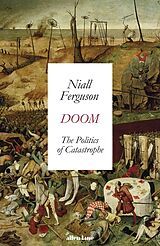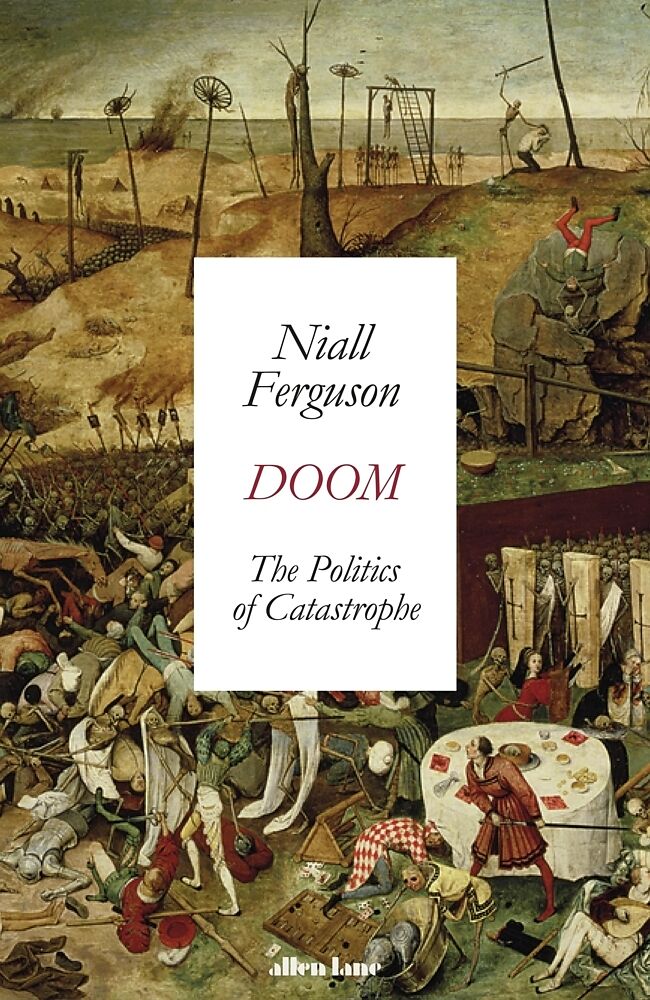Doom: The Politics of Catastrophe
Einband:
Kartonierter Einband
EAN:
9780241501764
Untertitel:
The Politics of Catastrophe
Genre:
Politikwissenschaft
Autor:
Niall Ferguson
Herausgeber:
Penguin Books
Anzahl Seiten:
496
Erscheinungsdatum:
06.05.2021
ISBN:
978-0-241-50176-4
Informationen zum Autor Niall Ferguson is one of Britain's most renowned historians. He is the Milbank Family Senior Fellow at the Hoover Institution, Stanford University, a senior faculty fellow of the Belfer Center for Science and International Affairs at Harvard, and a visiting professor at Tsinghua University, Beijing. His most recent book is The Square and the Tower. Klappentext Disasters are by their very nature hard to predict. Pandemics, like earthquakes, wildfires, financial crises and wars, are not normally distributed; there is no cycle of history to help us anticipate the next catastrophe. But when disaster strikes, we ought to be better prepared than the Romans were when Vesuvius erupted or medieval Italians when the Black Death struck. We have science on our side, after all. Yet the responses of a number of devloped countries to a new pathogen from China were badly bungled. Why? The facile answer is to blame poor leadership. While populist rulers have certainly performed poorly in the face of the pandemic, more profund problems have been exposed by COVID-19. Only when we understand the central challenge posed by disaster in history can we see that this was also a failure of an administrative state and of economic elites that had grown myopic over much longer than just a few years. Why were so many Cassandras for so long ignored? Why did only some countries learn the right lessons from SARS and MERS? Why do appeals to 'the science' often turn out to be mere magical thinking? Drawing from multiple disciplines, including history, economics and network science, Doom: The Politics of Catastrophe is a global post mortem for a plague year. Drawing on preoccupations that have shaped his books for some twenty years, Niall Ferguson describes the pathologies that have done us so much damage: from imperial hubris to bureaucratic sclerosis and online schism. COVID-19 was a test failed by countries who must learn some serious lessons from history if they are to avoid the doom of irreversible decline. Zusammenfassung Disasters are by their very nature hard to predict. Pandemics, like earthquakes, wildfires, financial crises and wars, are not normally distributed; there is no cycle of history to help us anticipate the next catastrophe. But when disaster strikes, we ought to be better prepared than the Romans were when Vesuvius erupted or medieval Italians when the Black Death struck. We have science on our side, after all. Yet the responses of a number of devloped countries to a new pathogen from China were badly bungled. Why? The facile answer is to blame poor leadership. While populist rulers have certainly performed poorly in the face of the pandemic, more profund problems have been exposed by COVID-19. Only when we understand the central challenge posed by disaster in history can we see that this was also a failure of an administrative state and of economic elites that had grown myopic over much longer than just a few years. Why were so many Cassandras for so long ignored? Why did only some countries learn the right lessons from SARS and MERS? Why do appeals to 'the science' often turn out to be mere magical thinking? Drawing from multiple disciplines, including history, economics and network science, Doom: The Politics of Catastrophe is a global post mortem for a plague year. Drawing on preoccupations that have shaped his books for some twenty years, Niall Ferguson describes the pathologies that have done us so much damage: from imperial hubris to bureaucratic sclerosis and online schism. COVID-19 was a test failed by countries who must learn some serious lessons from history if they are to avoid the doom of irreversible decline. ...
Autorentext
Niall Ferguson is one of Britain's most renowned historians. He is the Milbank Family Senior Fellow at the Hoover Institution, Stanford University, a senior faculty fellow of the Belfer Center for Science and International Affairs at Harvard, and a visiting professor at Tsinghua University, Beijing. His most recent book is The Square and the Tower.
Klappentext
Disasters are by their very nature hard to predict. Pandemics, like earthquakes, wildfires, financial crises and wars, are not normally distributed; there is no cycle of history to help us anticipate the next catastrophe. But when disaster strikes, we ought to be better prepared than the Romans were when Vesuvius erupted or medieval Italians when the Black Death struck. We have science on our side, after all. Yet the responses of a number of devloped countries to a new pathogen from China were badly bungled. Why?
The facile answer is to blame poor leadership. While populist rulers have certainly performed poorly in the face of the pandemic, more profund problems have been exposed by COVID-19. Only when we understand the central challenge posed by disaster in history can we see that this was also a failure of an administrative state and of economic elites that had grown myopic over much longer than just a few years. Why were so many Cassandras for so long ignored? Why did only some countries learn the right lessons from SARS and MERS? Why do appeals to 'the science' often turn out to be mere magical thinking?
Drawing from multiple disciplines, including history, economics and network science, Doom: The Politics of Catastrophe is a global post mortem for a plague year. Drawing on preoccupations that have shaped his books for some twenty years, Niall Ferguson describes the pathologies that have done us so much damage: from imperial hubris to bureaucratic sclerosis and online schism. COVID-19 was a test failed by countries who must learn some serious lessons from history if they are to avoid the doom of irreversible decline.

Leider konnten wir für diesen Artikel keine Preise ermitteln ...
billigbuch.ch sucht jetzt für Sie die besten Angebote ...
Die aktuellen Verkaufspreise von 6 Onlineshops werden in Realtime abgefragt.
Sie können das gewünschte Produkt anschliessend direkt beim Anbieter Ihrer Wahl bestellen.
Loading...
Die aktuellen Verkaufspreise von 6 Onlineshops werden in Realtime abgefragt.
Sie können das gewünschte Produkt anschliessend direkt beim Anbieter Ihrer Wahl bestellen.
| # | Onlineshop | Preis CHF | Versand CHF | Total CHF | ||
|---|---|---|---|---|---|---|
| 1 | Seller | 0.00 | 0.00 | 0.00 |
